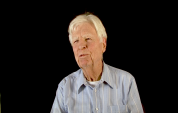4:19 | After the war was over, McIntyre recalls many civilian interactions with the German people. Many of them were pleasant since they wanted to get on the US Army's good side, but some of them were still loyal to the Hitler youth program. Although he did eventually get to come back home to the states, McIntyre says that World War II has changed his life forever. He went back to Europe as soon as he could to be involved with the Foreign Service. (This interview made possible with the support of MS. KETURAH THUNDER-HAAB.)
Keywords : Stuart McIntyre civilian interaction German returning home Europe Foreign Service surrender pistol Hitlerjugend (Hitler Youth) Scotland Cigarette Camp Germany Portland OR Columbia University international relations United Nations (UN) Moscow Dusseldorf Germany Brussels White House

After growing up in and near Hollywood and Portland, Oregon, Stuart McIntyre decided to sign up for the Army's Specialized Training Program back before World War II. He was accepted into Stanford University for a brief while until he was called to action following the US involvement in the ongoing war. He was immediately sent to Fort Benning for infantry training. (This interview made possible with the support of MS. KETURAH THUNDER-HAAB.)
After his infantry training at Fort Benning, McIntyre went to Fort Bragg and learned to be a jeep driver for his company. Whenever someone needed transport he was the guy they would call. One day while at training the unexpected happened; after being given a chance to fire a machine gun, he ranked expert on the amount of targets he hit. (This interview made possible with the support of MS. KETURAH THUNDER-HAAB.)
When his mortar company was finally needed overseas, McIntyre was sent aboard the George Washington; arriving in France. McIntyre had his first combat in Baccarat, France, and faced a heavy German counterattack on New Year's Eve during Operation Nordwind (Northwind). (This interview made possible with the support of MS. KETURAH THUNDER-HAAB.)
The battle of Baccarat took many lives with it, but it left McIntyre unharmed. From there he describes what his company had to do next, one significant event being the battle of Bitche, France. At one point, his hand was wounded during combat, and he was up for a purple heart because of it. When asked by the medic if he wanted to be put down for one, he declined not knowing it would get him points to go home sooner. However, he did manage to receive a bronze star later on down the line. (This interview made possible with the support of MS. KETURAH THUNDER-HAAB.)
McIntyre explains how a mortar is fired and the repercussions of firing one over and over for years. To this day, he still has problems with a ringing in his ears because every time he loaded the mortar it was extremely loud. He also remembers handling a bazooka and attempting to use it to shoot down a German aircraft. (This interview made possible with the support of MS. KETURAH THUNDER-HAAB.)
McIntyre remembers that it wasn't all the time that the US Army was very coordinated from one company to another, and so while in his foxhole he noticed a tank parked next to him. It was quite a hazard because it was drawing enemy fire right to their exact location. The conditions of war were of course unhealthy, but nonetheless he and his company succeeded in crossing the Rhine River and survived in Kassel till the end of the war. From there, he was tasked with postwar guard duty. (This interview made possible with the support of MS. KETURAH THUNDER-HAAB.)